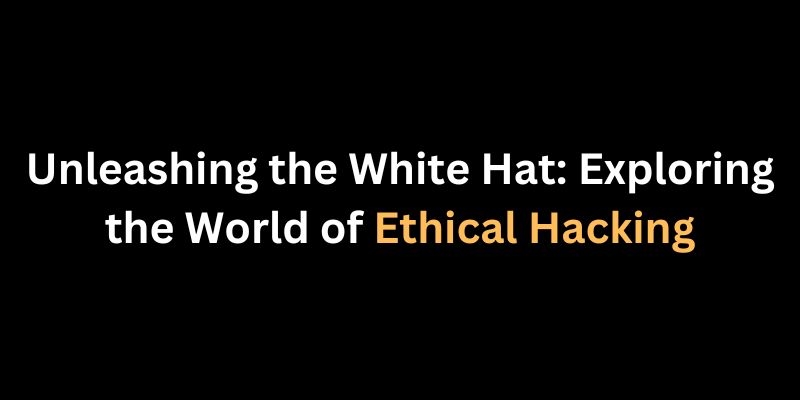Unleashing the White Hat: Exploring the World of Ethical Hacking
Introduction:
In the realm of cybersecurity, the term “hacking” often carries a negative connotation, conjuring up images of malicious individuals exploiting vulnerabilities for personal gain. However, there exists a noble counterpart to this concept known as ethical hacking. Also referred to as white hat hacking, this practice involves leveraging technical skills to identify weaknesses in computer systems, networks, or software with the permission of the owner.
This article delves into the captivating world of ethical hacking, shedding light on its significance and exploring the key aspects that make it an essential tool in safeguarding our digital landscape. Learn Ethical Hacking Course in Chennai from the Hacking Experts of FITA Academy. The hacking course in Chennai provides in-depth & practical training to get placed in top companies.
The Role of Ethical Hackers:
Identifying Vulnerabilities for Protection
Ethical hackers serve as guardians of our digital infrastructure. Their primary objective is to simulate potential cyber threats, infiltrating systems to uncover vulnerabilities before malicious actors can exploit them. By adopting the mindset of a hacker, these experts conduct comprehensive security assessments and penetration tests, analyzing network configurations, application codes, and system architectures to identify weaknesses. This proactive approach enables organizations to rectify vulnerabilities, fortify their defenses, and enhance the overall security posture.
Mitigating Risks and Strengthening Security
Ethical hacking plays a pivotal role in mitigating risks associated with cyberattacks. By conducting systematic and controlled penetration testing, white hat hackers help organizations stay one step ahead of cybercriminals. Their efforts provide valuable insights into the weaknesses of systems, allowing businesses to implement robust security measures. Through vulnerability assessments, penetration testing, and security audits, ethical hackers contribute to strengthening the security infrastructure, reducing the likelihood of successful cyber intrusions.
Ensuring Compliance and Regulatory Requirements
In an increasingly interconnected world, organizations must adhere to stringent regulatory standards and compliance requirements. Ethical hackers help businesses navigate this complex landscape by identifying gaps in compliance and ensuring adherence to industry-specific guidelines. By conducting thorough assessments and audits, they provide valuable recommendations to align security practices with regulatory frameworks, safeguarding sensitive data and maintaining the trust of customers and stakeholders.
Essential Skills of an Ethical Hacker:
Proficiency in Technical Domains
Ethical hackers possess a deep understanding of computer systems, networks, and programming languages. They are proficient in multiple programming languages such as Python, C++, or Java, enabling them to comprehend intricate code structures and identify potential vulnerabilities. Additionally, they have expertise in operating systems, network protocols, and database management systems, allowing them to analyze and manipulate different elements within an infrastructure.
Continuous Learning and Adaptability
The field of cybersecurity is constantly evolving, with new threats and vulnerabilities emerging regularly. Ethical hackers must stay updated with the latest trends, tools, and techniques to effectively combat these challenges. Their insatiable curiosity and commitment to continuous learning enable them to adapt to evolving threats, ensuring they remain at the forefront of the cybersecurity landscape. You can join an Ethical Hacking Online Course at FITA Academy and learn how to protect data from malicious hackers. Learning Ethical Hacking Through Online Cochin paves a great way towards your career.
Analytical and Problem-Solving Skills
Ethical hackers possess strong analytical and problem-solving abilities. They excel in dissecting complex systems, identifying potential weaknesses, and devising innovative solutions. Their keen eye for detail, combined with their logical reasoning skills, allows them to navigate intricate security architectures and pinpoint vulnerabilities that may elude the untrained eye.
Conclusion:
Ethical hacking serves as a formidable weapon against the rising tide of cyber threats. By leveraging their technical expertise and profound knowledge, ethical hackers play a pivotal role in safeguarding our digital world. Through proactive identification of vulnerabilities, mitigation of risks, and adherence to regulatory requirements, these white hat hackers ensure the integrity, confidentiality, and availability of critical data and systems. As the cybersecurity landscape continues to evolve, the contributions of ethical hackers remain indispensable in securing our digital future.

